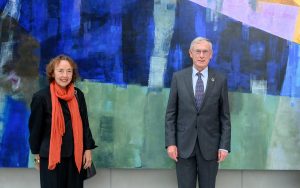Transformation in response to the climate crisis and digitalisation, the cohesion of the EU and its role in the emerging great power competition – the tasks facing the new German Government are enormous. One, however, is almost always underestimated: our relations with Africa. Yet opportunities and challenges are growing there that urgently require answers.
Africa’s population has increased fivefold since the middle of the 20th century to 1.3 billion. Already, one in two people there is younger than 18. In many of the continent’s 54 countries, democratic elections are taking place, civic engagement and a free press are burgeoning, young people are demanding their right to work and to participate in political life, and economic development is taking off through innovation. China has risen to become the most powerful investor; others are also offering their services. Africa is no longer dependent on Europe; it has a choice.
In view of this, the formulation of an Africa policy for the 21st century is one of the great questions in shaping the political future. It is a task for today, not for later. To put it off would be to miss opportunities and exacerbate problems. For many successes are on the brink. Climate change and pandemics are setting back the often successful development efforts in Africa. Conflicts threaten to escalate. And while in Europe the pandemic and transformation are cushioned with billions and the cold stores are full of unused vaccines, only six percent of the African population is fully immunised. Europe’s vaccine egoism has cost trust – this has been conveyed to us very clearly by African interlocutors. Partnership rhetoric cannot cure this, only credible action can.
Our action should now prove itself, firstly, in the rapid forwarding of unused vaccines and an effective European contribution to the establishment of vaccine production. Secondly, many African countries urgently need more financial leeway to cope with the consequences of the pandemic. Following the G20’s suspension of debt servicing, debt restructuring may also be necessary. In any case, Germany should also participate in the project to pass on part of its special drawing rights newly allocated by the IMF to those who urgently need them.
Beyond the pandemic, two issues are fundamental for development and stability in Africa: jobs and security. Both are closely related; both are in trouble.
The creation of an African Continental Free Trade Area is a strategic course for more economic growth and jobs that deserves great support. German industry should not wait for further risk-hedging, but should promote new markets with entrepreneurial creativity. Not least, German industry has all the competence to help Africa process its own raw materials and create jobs. A special envoy for economic relations with Africa could powerfully support this process.
Violent conflicts prevent job-creating investments. Poverty and the lack of prospects fuel conflicts and force people to leave their homes. Breaking this vicious circle is also in Europe’s interest. The “National Security Strategy” announced in the traffic light coalition consultations should therefore also formulate ideas for overcoming the conflicts in Africa. The main goal must be prevention. Germany should no longer duck out of the way if, in consultation with African partners, robust operations are necessary. Military as well as civilian engagement should be concentrated on the most important hotspots, adequately equipped and driven by the desire to make a real contribution to stabilisation. The time of half-hearted engagement should come to an end.
Moreover, Europe would do well to win Africa as a partner. Stabilising the world’s climate, protecting biodiversity and securing peace are problems that need to be tackled together. Both continents will only remain capable of shaping the world through alliances. The question of whether the EU, and with it Germany, is capable of global politics will be decided not least in Africa. A new philosophy of cooperation requires a much more differentiated view and much more knowledge about the dynamics in Africa; it requires personnel and political investments in exchange, scholarships and, not least, the overdue creation of an institute for applied Africa research in Berlin.
The AU-EU Summit in February 2022 is an opportunity for the new German Government to set new accents. Africa policy for the 21st century should see Africa not as a continent whose problems need to be solved in a caring manner, but as an independent actor and partner whose potential can also contribute to solving our problems.
